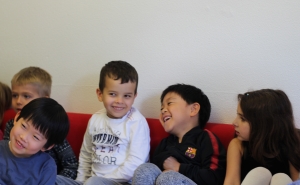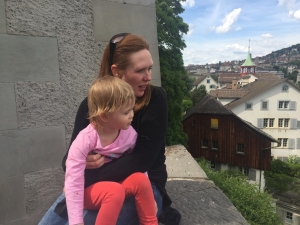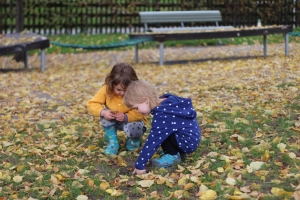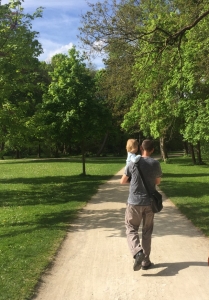Language fondue: Which German should my child learn first in Zurich?
by Monica Shah Zeeman
If you’ve recently moved to German-speaking Switzerland or are just beginning to plan your child’s education, you’ve undoubtedly come up against the question of language. Should they learn German, Swiss German or both? When is the right time and how to introduce it without scaring them off?
Head of Children First’s bilingual school Monica Shah Zeeman discusses bringing up children within the multi-lingual language environment that Zurich has become.
WINDOWS OF OPPORTUNITY
Most international families in Switzerland find that learning a new language at an early age is a great idea. If the new language is spoken by someone who cares for them regularly, with whom the child bonds well, learning over a few years alongside their mother tongue should present no problem. At least half of their day needs to be in the new language over a couple of years. Young babies absorb the most sounds, while 3 to 5 years of age is according to research the next best window of opportunity.
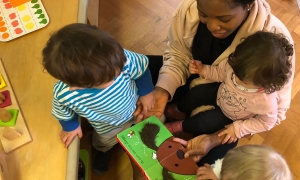
But in and around Zurich, parents need to consider not just how to teach their children German, but which German to prioritise.
HEAD V HEART
The Swiss are a people proud of their heritage and language, and they speak that language socially and at home – it is what binds them together as a culture. And yet Hochdeutsch, or ‘High’ German, is most of the country’s written language, and is taught to Swiss-German children from Grade 1. This means international parents have to choose if their child will learn Swiss German first – a ‘heart’ language spoken socially – or High German – a ‘head’ or ‘school’ language.
THE HOLY GRAIL OF INTEGRATION
If you’re planning to stay a while, the holy grail of expat life in Switzerland is full social integration. Learning Swiss German will help your children make Swiss friends, and if they have Swiss family they will certainly need to speak it. But the educated Swiss nowadays are not the pure Swiss families of the past. Many are themselves multicultural and multilingual. You may find your child can share their international culture proudly with their Swiss friends and not have to give everything up to be accepted.
But if you decide you want to put down roots in this part of Switzerland, your children will want to have enough Swiss German not to be seen as outsiders in their social groups by the time they are at secondary school.
Even if the whole family is learning standard German, try learning Swiss German with new friends and using the Swiss system for schooling from the ages of 8 or 12, transition points in the Swiss system. There are private Swiss schools including bilingual ones which lead into the free Swiss Gymnasia or some very good secondary vocational programmes.
DARE TO BE DIFFERENT: PRIORITISE HIGH GERMAN
While it seems to try to learn the local dialect first, as Swiss children do, for international children it makes a lot more sense to reverse the order in which they learn the different types of German.
Your children will be examined in High German at school, and in my opinion it is the best language on which to focus your first efforts. Academic work and books are written in High German, and to do well at school and to attend Swiss colleges and universities, your child will be assessed in High German.
Plus, integration cannot be your goal no matter what the cost. If your children learn High German first, they will develop a better ear for grammatically-correct language, and will be able to adapt to Swiss German when the situation calls for it. And full integration often takes much longer than most people predict: about as long as Swiss citizenship currently requires, about 10 years if you go for it!
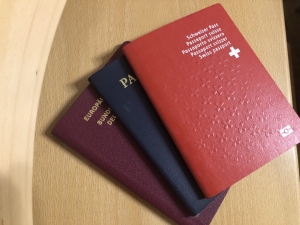
Semi-integration is a more realistic goal and it will enable your children to keep their identity as global citizens who speak more than one language. It might take a bit longer for you and your children to integrate, but it will not stop you calling Switzerland home, which will come after just a few intense years of throwing yourselves into Swiss cultural life which is rich and varied and…multilingual!!
ACKNOWLEDGING EMOTIONS
If siblings already speak another language, a child may derive security from maintaining their place in their family peer group. Moving a child around may also have an emotional impact which influences their openness to learning a new language. To meet your goal of learning a language to a high enough standard for it to be useful, try to allow enough time for the process of getting settled with a new daycare or school, and a new home environment. Your children need you to understand this is a long-term project, and one in which you understand it is an emotional experience for them to live in a new culture, not just a matter of learning new sounds and skills. Years will be needed to adjust to learning not just one new language but several, to different degrees of fluency. Try not to rush your child or force them to ‘sink or swim’.
FIRST WORDS, FIRST THOUGHTS
Don’t forget that your child’s mind needs to develop, not just their language. The two are so closely connected that it would be a great pity to change your language with them and have them miss out on hearing you speaking a language that fluently expresses your thinking. Speak your own language with your child and build a new language by all learning a new language at the same time, alongside your main family language. If you are really serious about them learning more than one new language, allow two years per new language as they do at the European School near Brussels. Allow time for each language to get established in their social circle, too. In the Swiss system there are several good transitional points when other children will be changing schools – before and after two year Kindergarten, after 3rd class, and after 6th class for example.
BILINGUAL CHOICES
Living with several languages forces you to juggle your child’s needs and your family’s future.
In and around Zurich bilingualism has really become established as the desirable norm, not just at home but also, ambitiously, at primary school level too. However, international families do not have the choice of true bilingualism in this system – in general these schools offer 70% German and 30% English rather than 50:50. The inevitable lesser priority given to English means you may have to sacrifice reading and writing to a University level in their home languages, which may be much more global and easier to sustain in the future.
If you cannot afford a (private) Swiss bilingual primary school or your children do not do well in trying to achieve in more than one language, you can either choose to go local (make German their main spoken and written language if you can sacrifice their written English), or choose an international school, however unfashionable that seems these days.
PRIORITISE YOUR CHILD
If you are not sure how long you are staying here, I can recommend you don’t sacrifice your children’s broad education in English (or French) just for the sake of learning German. At the end of the day the kind of person they become will be a result of a whole range of influences including where their family comes from, how they behave at school, how you communicate with the teachers in the first years of school and who your family friends are outside school. If they have trouble adjusting to the local culture or Swiss languages, they will thank you for not giving up on their home language. Their identity, culture and sense of self are likely to remain international anyway.
However, if you want to settle in Switzerland permanently, it might be worth sacrificing English and focussing your efforts on integration. My family decided to give up their local home language during our school years and as a result we fitted in perfectly with our majority English friends. They just did not need their home language or culture in that phase of their lives and they adopted English which gradually, over a decade, became their best language! We all want to keep our options open for an international future, but ultimately the most important thing is that children are happy and settled in their new environment.






